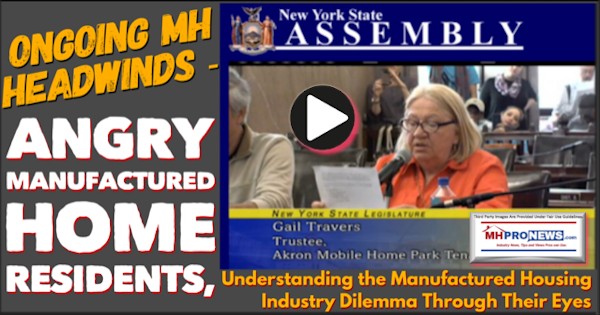
HUD Secretary Ben Carson has been promoting manufactured homes as a sustainable private-sector element to the affordable housing crisis since early in his tenure at the Department of Housing and Urban Development (HUD).
That acknowledged and saluted, as much as Secretary Carson has been striving to do, his factually grounded theme is largely drowned out by a variety of other voices.
Among them? The angry resident who lives in a pre-HUD Code mobile home, or in a manufactured home built on or after the date that the HUD Code construction and safety standards went into effect on June 15, 1976.
Those angry residents often misuse terminology, much the same as other Americans or much of the mainstream media does.
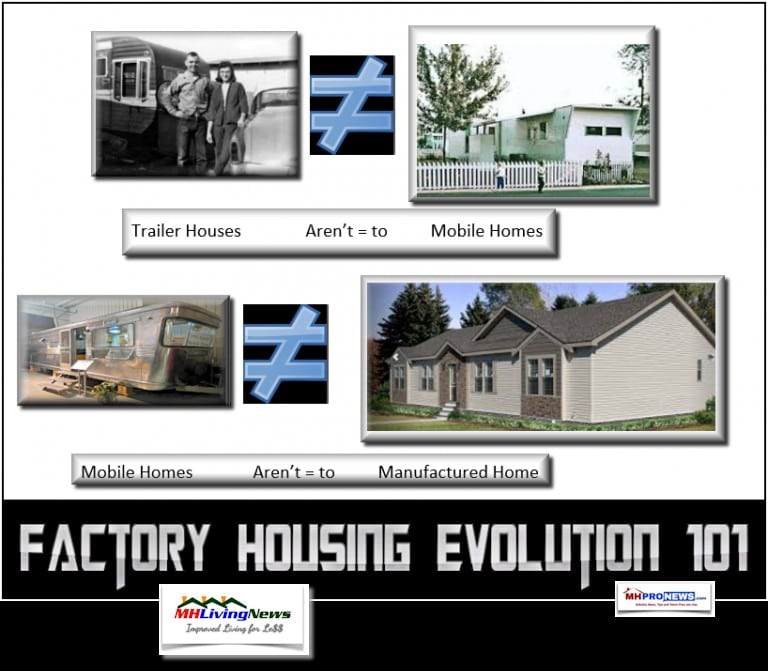
With that backdrop, there is no denying that the problem that Gail Travers, a resident and ‘trustee’ in Akron, New York’s “Akron Mobile Home Park Tenants Association” exists in numerous U.S. markets.
As you read this letter below from Ms. Travers, imagine that you have been considering buying a manufactured home. How excited would you read her letter, would you still be ask excited about making that same decision?
The letter is presented neither to either endorse or debate her contention. There is plenty of evidence for her claim. As our analysis which follows will reflect, our biggest point of departure with Ms. Travers and the thousands of others like her in numous states is the proposed solutions that many such voices advances in the face of the very real and painful challenges they share.
With that backdrop, here is her letter to the editor of the Buffalo News.
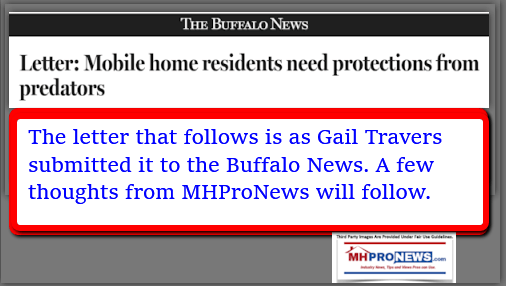
I read with interest the May 21 editorial: “NYC Rent Laws Unneeded Here.” New Yorkers throughout the state need safe, affordable housing, like elsewhere across the country.
The people of New York State fear monied investors are stealing our communities and future. We want our legislators to enact laws to protect the decent, affordable housing options that remain. And it is not just in cities.
Look at what is happening to mobile home parks – the largest segment of affordable housing in the country. Parks are being purchased by out of state investors with little interest in the area. Corporate investors like Sunrise Capital from Clearwater, Fla. (who bought Akron Mobile Home Park in Akron in late 2017) are snapping up parks, raising rents, and disrupting the well-being of life for the people who live there, most of them on fixed incomes. Now Sunrise has purchased another park in Lockport and is attempting to do the same as they have tried to do in Akron.
Mobile home owners who rent the land on which their homes sit need protections from these predators, as do apartment renters elsewhere.
This sentence from the editorial is interesting: “There are affordable housing options here, not on every block, but enough that most working people can find a place to live.” Shouldn’t ALL people have a place to live? We need safe, affordable housing free from exploitation. If our legislators are listening to their constituents, they will vote for protections.
Gail Travers, Trustee in Akron Mobile Home Park Tenants Association
Akron
— End of Buffalo News letter to editor by Gail Travers. —
Even a quick Google search reveals that Ms. Travers has been active in engaging the media and legislators.
For example. You can see Travers’ testimony before the NY State Assembly hearing, starting about the 24:32 time mark, and ending about the 28:42 time mark.
It must be noted that other manufactured home community residents are also sharing similar stories in that same video, posted above. So for those who are not familiar with this issue, viewing more of this video is sobering. It paints the picture that her letter to the Buffalo News stated.
It may bear mention that Stacey White, noted on the NY State Assembly website as “a leader at MHAction,” also testified at this same session. Certainly, some of the talking points that Ms. Travers used are like those raised by MHAction in their white paper, videos, talking points, etc. The letter from the Democratic chair of the committee that held these hearings is linked here as a download.
Rent Control?
Rent control is one of the notions commonly floated as a ‘solution’ to such problems as Travers recounts. But that has been passed in other jurisdictions, and it has routinely proven to not work as it was believed it might. Who said? Another resident activist in Delaware, that said as much, in a statement found in the report linked here.
Rent control, regardless of who promotes it, fails as badly as wage-price controls did when the late President Richard Nixon (GOP) promoted that ploy during his demonstration, and he watched that fail. The free market routinely works better than a command and control economy, so long as the free market isn’t badly distorted. For those who doubt that, just look at communist-run China, were virtually empty, nearly new high-rise housing buildings stand. Rent control, as several linked reports further below reveal, simply doesn’t work as its proponents claim.
Indeed, what is occurring is a distortion of the free market, that’s why this problem that Travers describes exists. The good news? Secretary Carson – should he opt to do so – holds in his hands the key that could unlock the solution to this vexing issue.
Corporations and Local Officials Distorting the Free Market, and What Secretary Carson Could Do
Secretary Carson is quite right when he repeated said in recent weeks that the heart of the problem for housing is found in increasing the supply of affordable homes. When more affordable housing options exist, then the increasing spike in prices will begin to abate.
Besides Secretary Carson, who else has said as much? How about Lawrence Yun, Ph.D., Chief Economist for the National Association of Realtors (NAR). Writing in Forbes, Yun said the following.
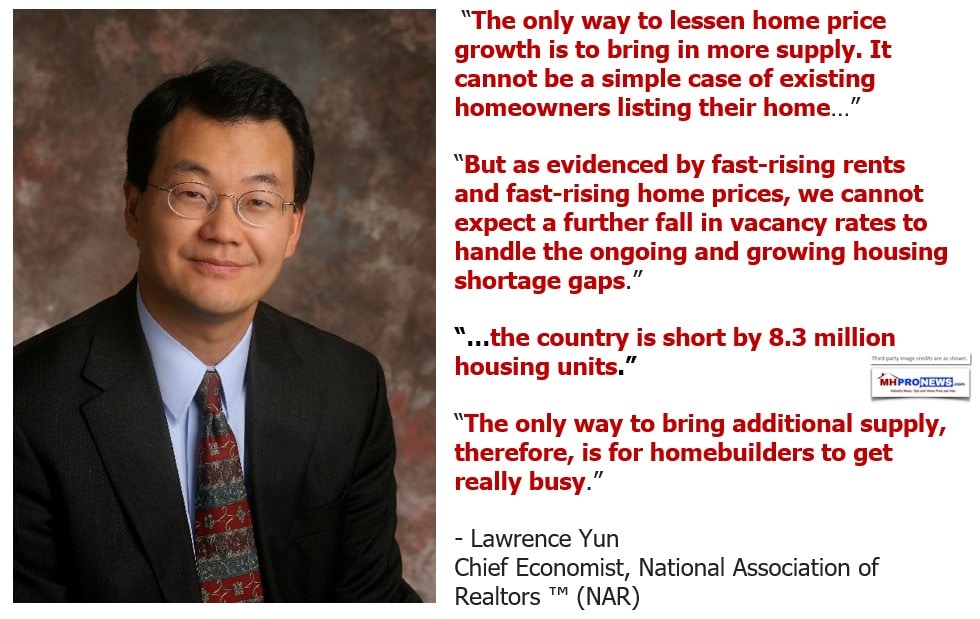
But he did more than just say that, per our sources, it was Dr. Yun who encouraged the study of manufactured housing by NAR’s Scholastica ‘Gay’ Cororaton, Certified Business Economist (CBE).
Cororaton made a similar claim to Secretary Carson’s claim of the ‘resilience’ of manufactured homes, as the quote/graphic below reflects. It bears mention that her 2018 research cited our publisher, L. A. ‘Tony’ Kovach and MHARR’s President and CEO, Mark Weiss, JD, in her first footnote on page 48. See her insightful research, linked here.
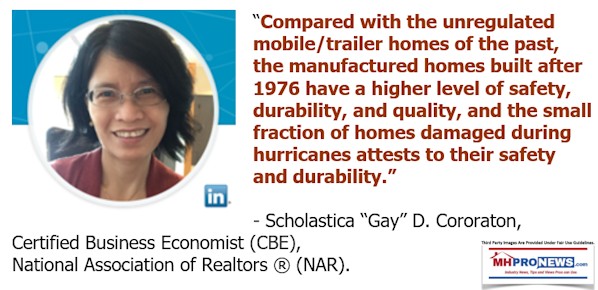
The facts that Carson and Cororaton touted complement each other to a significant degree.
But that is not the message that the vast majority of Americans are getting about manufactured homes, because of the image-plagued ‘mobile home parks’ (SIC). It is from such land-lease communities where millions of pre-HUD Code mobile homes and post-HUD Code manufactured homes are found.
It is from such land-lease communities where a significant number of ‘bad news’ stories originate. Note the screen capture from Google news, below, that makes the point.
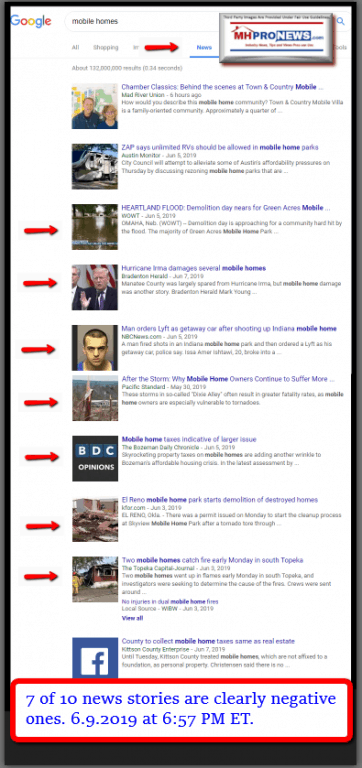
It is arguably from ‘black hat’ operations that Travers and others understandably complain about that are causing significant levels of the blowback that manufactured home (MH) living experiences.
On the one hand, we respect the right of Travers and others to organize and ‘fight back.’ But the reality is that some of what they do arguably undermines their own economic position. More on that another time, because what the focus should be is how can the issues they raise best be addressed?
Let’s look.
Manufactured Housing – White Hats, Black Hats, Investing, Consumers, MH Independents
Manufactured Home Residents, MH Investor Reality Checks
If an investor came into a community like Akron, paid a lot to buy what is a commercial property, and then tried to aggressively hike site fees (lot rents), what options does someone like Travers have today? In her area, and many others, the choices may be very limited.
But if ‘enhanced preemption’ were being aggressively promoted, and/or new communities were coming on-line, the dynamic would shift.
This is what is missing from Secretary Carson’s pro-manufactured home dialogue. Our sources at HUD, the fact that HUD officials asked about this question declined comment, and the utter lack of any mention of the words “enhanced preemption” on the Manufactured Housing Institute (MHI) website all suggest that the good doctor has been kept in the dark on this subject.
That begs the question, why?
That should also beg the question, why doesn’t the Manufactured Housing Institute (MHI) have that critically valuable phrase on their website?
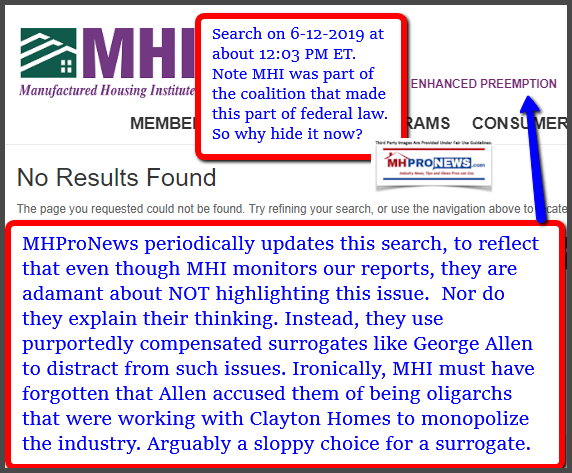
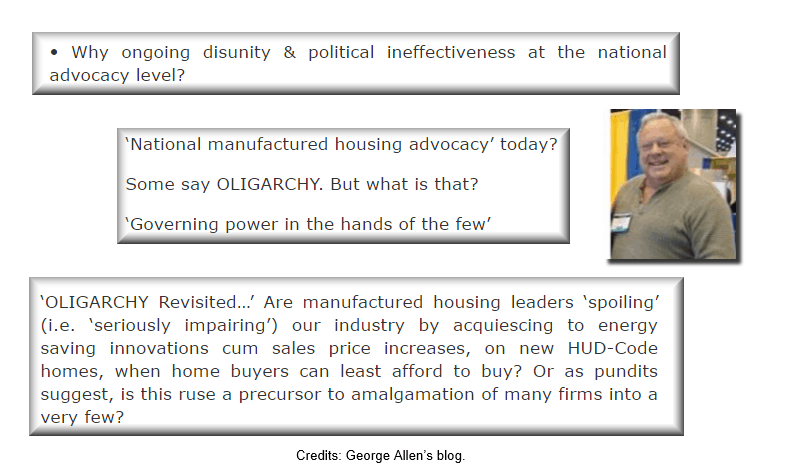

Or why doesn’t the MHInsider – who along with brown-noser George F. Allen – who purportedly routinely regurgitate whatever their overlords in Arlington, VA desire – lack the words on their ‘professional’ blog?
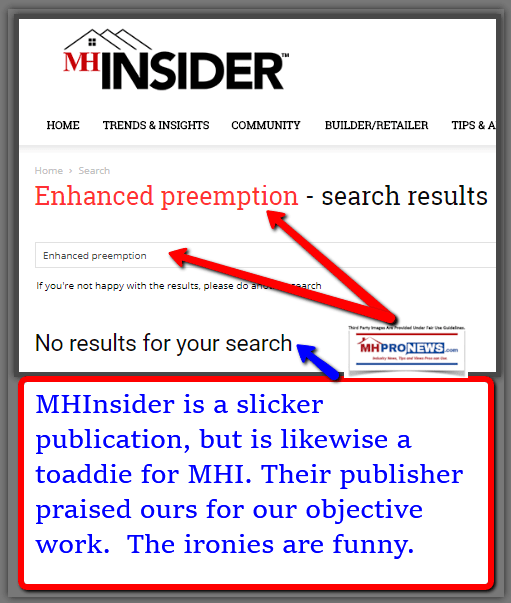
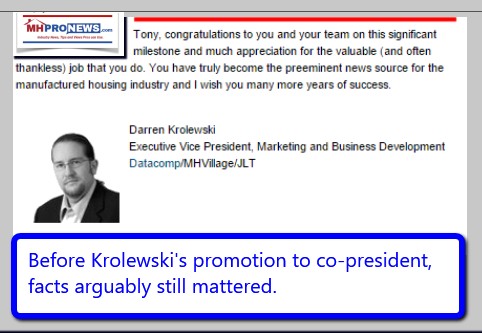
By contrast, facts, problem, and solution oriented Manufactured Housing Association for Regulatory Reform has numerous articles on the topic of Enhanced Preemption.
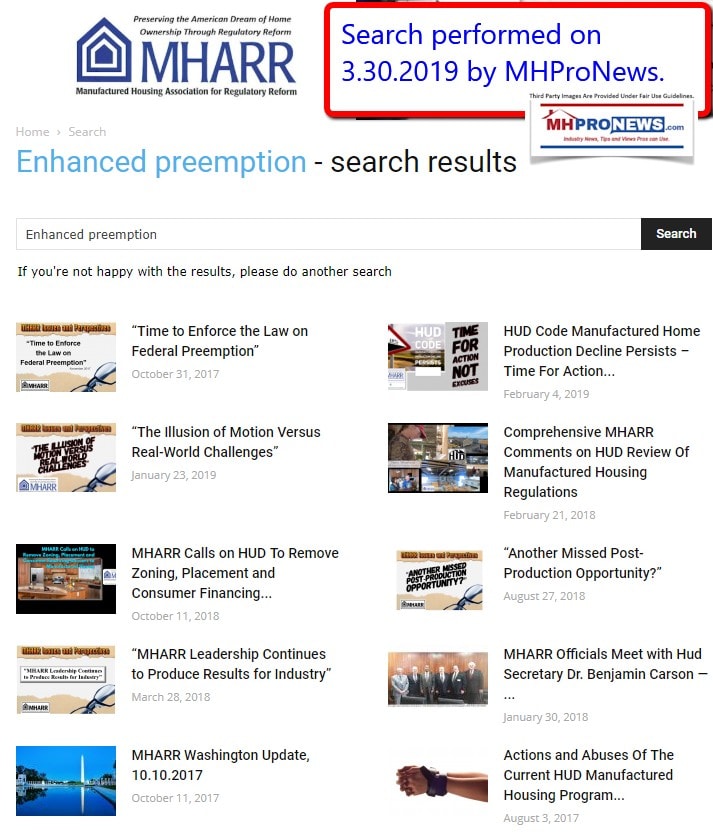
So too here on MHProNews, or ManufacturedHomeLivingNews. See what the Google search done today reveals.
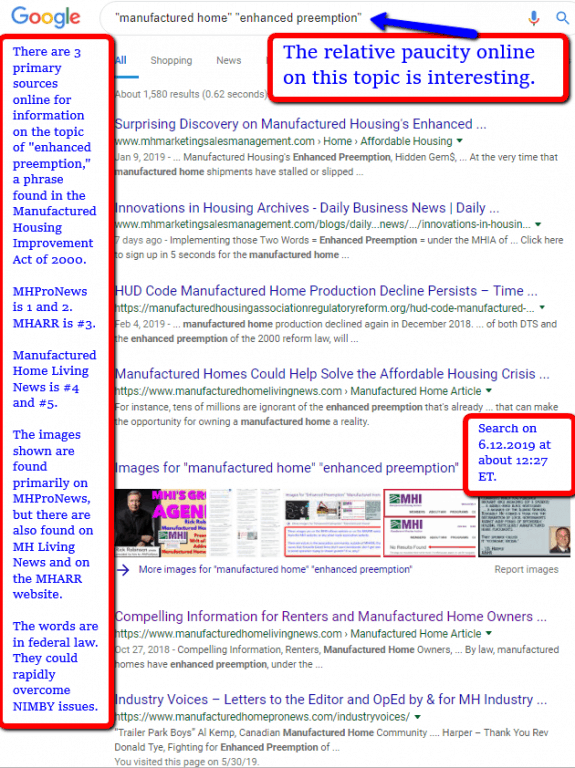
This goes back to the argument that the power players behind MHI are posturing efforts to promote manufactured housing, but do so tepidly. Even brown-noser Allen admitted in a recent post that MHI was essentially dragged into the Innovative Housing Summit (IHS). He downplayed the key role that companies played, and made it look like MHI rose to the occasion, as if to save the day.
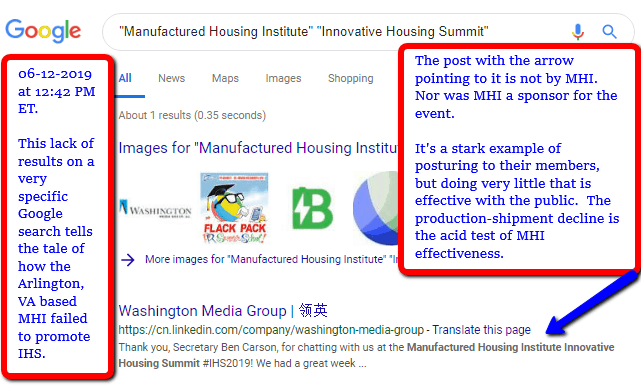
If so, why was there so little public media coverage of the event from a manufactured housing perspective? That’s an acid test. The rest is window dressing for those who will buy whatever the big boys sell.
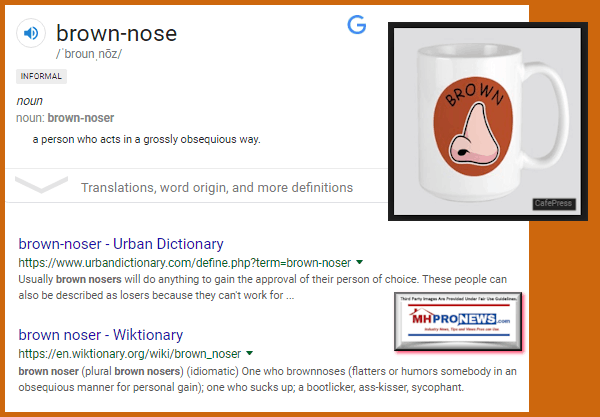
Frank Rolfe…
What MHI member and controversial community investor Frank Rolfe referred to as customers being chained to a Waffle House is apt but ugly description of this current environment.
Investors and resident groups like MHAction, NMHOA, or others talk about that point, each from their own perspective. They agree, for example, that few move homes, and that the cost of such a move of a mobile/manufactured home can be $5,000
But the solution is potentially simple. HUD could begin implementing the solution on short notice. It fits a theme that the Trump Administration has repeated many times.
“Enforce the law” on “enhanced preemption.”
HUD has oddly used their power of enhanced preemption only rarely, but it has been used, as the screen capture of the top of letter to a local jurisdiction below
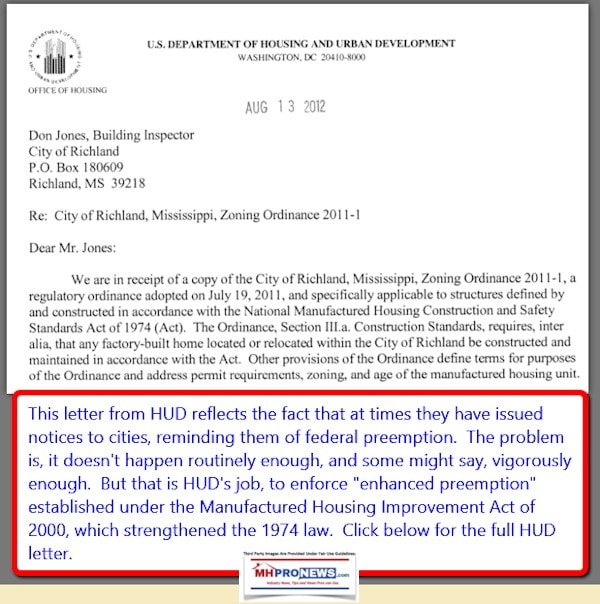
What is missing is making that kind of letter from HUD to local jurisdictions a routine. HUD could rapidly start the fix of problems like those Travers raised, simply by enforcing enhanced preemption routinely. Doing so would open up new options for current and potential manufactured home buyers.
That’s why MHARR has been promoting it for years, and it is the same reason that MHProNews and MHLivingNews has too. As a disclaimer, note that our trade media support of enhanced preemption predates any ads from MHARR by several years. In fact, while our firm was an MHI member, our management was mystified that MHI didn’t push it. So as years of articles reflect, our editorial position has been consistent, unlike the ‘cowardly lion’ Allen – who when asked on the record – has not denied that he’s been rewarded for attacking MHARR, and this pro-growth trade platform. So, he’s purportedly guilty of doing what he accuses others of doing. How nice.
State association executives who are MHEC members know about enhanced preemption. The letter above was obtained at the request of a state association. But apparently, the word is out that MHI and the powers that be in MHVille don’t want this discussed.
Harper – Thank You Rev Donald Tye, Fighting for Enhanced Preemption of Manufactured Homes
Tony, I’ve been meaning to take a moment for a couple of weeks now, to send you this message. I apologize for mixing subjects, but – in the end – I believe you’ll find that all these topics relate to one another.
MHARR has provided notice to HUD Secretary Carson delivered by FedEx and is documented here. When carefully read, it reflects the intent of Democrats and other legislators who supported the Manufactured Housing Improvement Act (MHIA) in 2000.
The evidence in favor of enhanced preemption is compelling.
Which once more begs the question, if MHARR and congressional representatives who were in the mix are promoting the use of enhanced preemption, then why aren’t MHI and the big boys?
The logical answer, based upon the known evidence, is sad and sobering. The big boys benefit from the current state of affairs, because it allows them to consolidate more of the industry at a discounted price. Because it is subtle, it isn’t obvious. This fits Buffett’s ‘strategic Moat’ and other mantras.
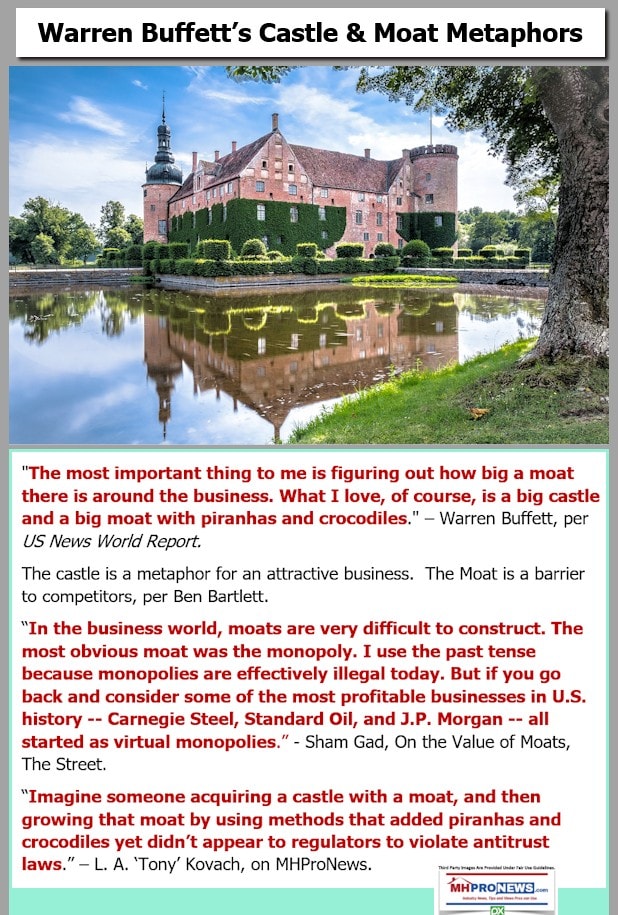
Bad news is arguably part of the moat. A lack of good news serves a dastardly use for someone who wants to consolidate the industry too. Since Buffett-led Berkshire bought Clayton, the industry is actually smaller today than then. How is that possible, during an affordable housing crisis, unless they wanted it to be so?
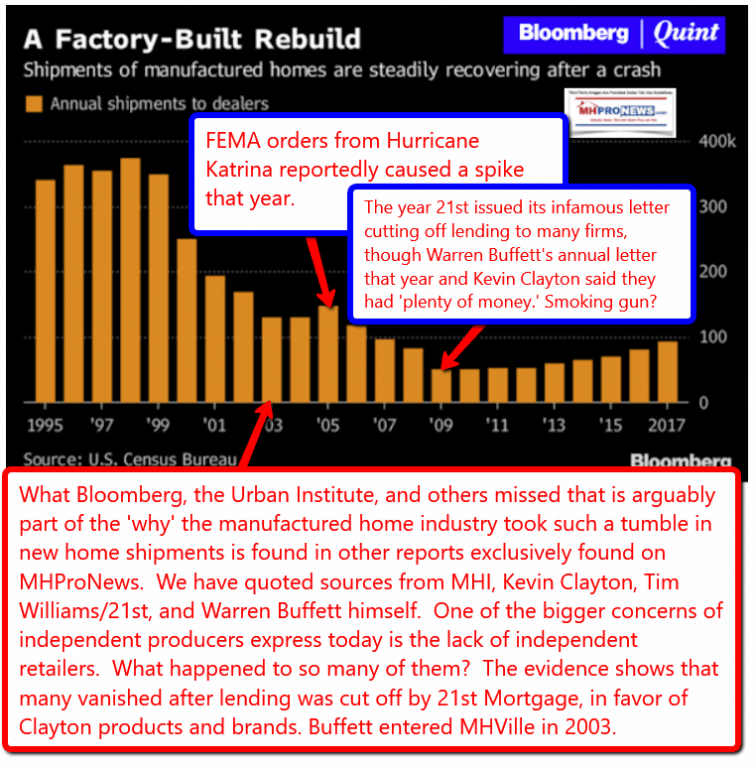
Rephrased, for the big boys, bad news for the industry is paradoxically useful. How so? Because it harms marginal players the most.
That causes businesses to sell out at a discount.
Some are silent on this trend, because they think they benefit from it. Others are silent out of fear of a loss of their jobs. But some, like Alan Amy call it out for what it is.
“How Gold Rules,” Tim Williams/21st Mortgage, MHI VP, State Execs Conference Call
“How Gold Rules,” Tim Williams/21st Mortgage, MHI VP, State Execs Conference Call
How Enhanced Preemption Would Make the Difference
If new communities were opening, or the Gail Travers of her area had an option to move to another community or to a development homesite, that would act as a competitive check
there have numerous times in our industry’s history that developers and communities paid to move someone in.
What’s missing, in other words, are options for consumers. Rent control is a band-aid that will likely cause fewer to want to build a community, than the few that already do.
The solution is to encourage the creation of more home sites.
MHARR’s initiative is potentially part of the solution. More on that at this link here.
As a total contradiction of his own arguments, Allen admits to the problems of predatory firms, without mentioning that many of these have clear ties to MHI.
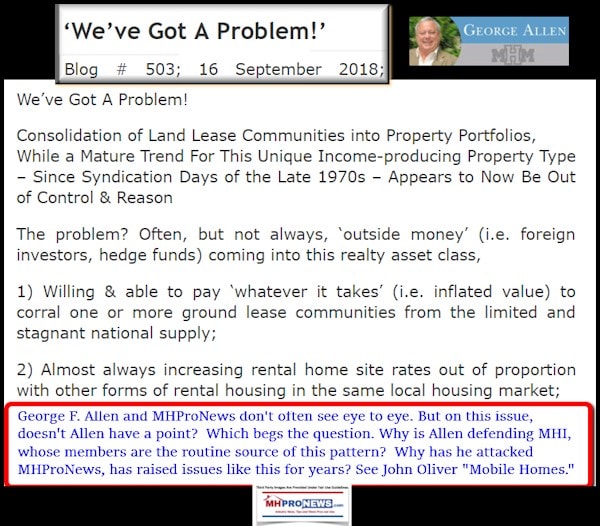
But if MHI and the industry’s powers that be truly wanted to solve the dilemma that faces Travers and others, they would have pressed HUD Secretary Carson, or Brian Montgomery at HUD, to ‘enforce the law’ on enhanced preemption.
Since many of the problematic news stories that are reported in the mainstream media are about issues related to the concerns raised by those like Ms. Travers, logically, the number of ‘bad news’ headwinds would abate as more options would come online. ICYMI, or need a referesher, see the article linked from the text-image box below.
Buffett’s Gift to Manufactured Housing Industry, Media Coverage…
Letters and news like the gut-wrenching woes of Gail Travers drive down interest in our industry and sales. To reverse the trends, one must get to and resolve the root issues.
For MHI or state association members with the cojones, don’t forget to write a letter and thank Warren Buffett for contributing via the Novo Foundation to the Tides nonprofit, which in turn supports MHAction. It is MHAction that has been generating more bad media for the industry than MHI claims to generate good media. Coincidence?
Or is it a coincidence that Berkshire Hathaway owned BH Media Group assets failed to cover IHS2019.
These are professionals. MHI has a professional public relations person on staff. What was that PR person doing prior to IHS2019? Why didn’t Kevin Clayton, or Tim Williams at 21st Mortgage Corp, ask Berkshire to have their media assets robustly cover Secretary Carson’s positive comments about manufactured housing?
The pattern is there to see, for those with open minds.
One must wonder if Last Week Tonight with John Oliver’s viral video misnamed “Mobile Homes” would ever have been made without Buffett’s support of MHAction? Oliver shows a screen shot of the MHAction co-branded white paper.
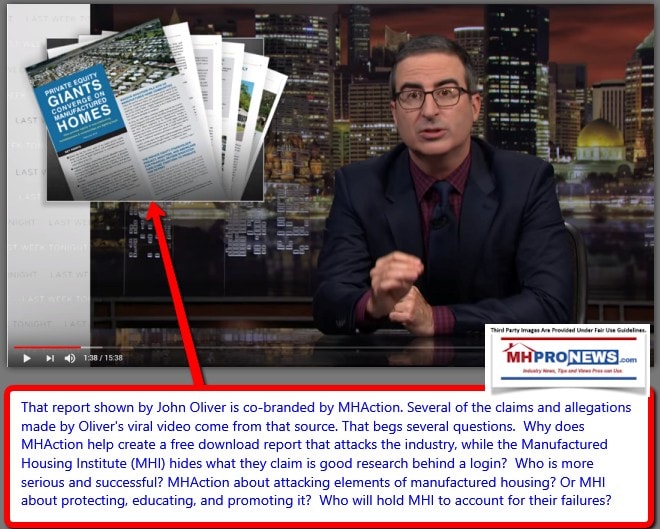
Whenever you see MHAction at work, are you thinking of Warren Buffett? Of Clayton Homes and 21st Mortgage Corp?
Prosperity Now, Nonprofits Sustain John Oliver’s “Mobile Homes” Video in Their Reports
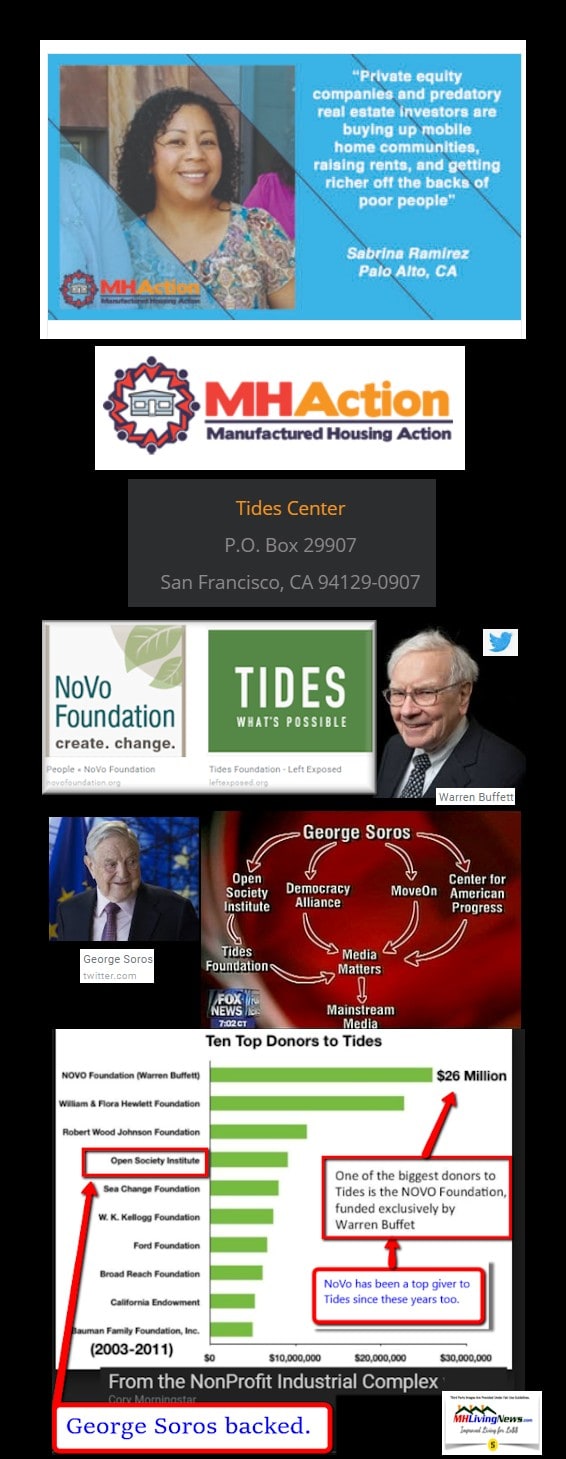
Conclusions – The Solution for Residents and Independents
Without supply and demand coming into better balance, the manufactured home industry is logically heading into a blind alley. Communities will slowly return to capacity, after years of being artificially depressed as evidenced by the documented machinations like the one linked here. When asked, MHI, Clayton, 21st and their attorneys have repeatedly declined comment on those documents.
What happens when existing communities reach capacity? What impact will that have on independent producers of HUD Code homes that supply communities?


Sure, there will be replacements of older mobile homes or earlier manufactured homes even when a community reaches effective capacity. But for the long-term health of the industry, and the benefit of consumers, it will require more #HousingChoice for consumers.
Enforce the law, as stated in the Manufactured Housing Improvement Act of 2000. That must be part of the savvy, long-term mantra of industry professionals, especially independents. It is on that point that consumer groups and industry independents could come together.

That’s this edition of “News Through the Lens of Manufactured Homes, and Factory-Built Housing,” © where “We Provide, You Decide.” © ## (News, analysis, and commentary.)

NOTICE: You can get our ‘read-hot’ industry-leading emailed headline news updates, at this link here. You can join the scores who follow us on Twitter at this link. Connect on LinkedIn here.
NOTICE 2: Readers have periodically reported that they are getting a better experience when reading MHProNews on the Microsoft Edge, or Apple Safari browser than with Google’s Chrome browser. Chrome reportedly manipulates the content of a page more than the other two browsers do.
(Related Reports are further below. Third-party images and content are provided under fair use guidelines.)
1) To sign up in seconds for our MH Industry leading emailed news updates, click here.

2) To pro-vide a News Tips and/or Commentary, click the link to the left. Please note if comments are on-or-off the record, thank you.
3) Marketing, Web, Video, Consulting, Recruiting and Training Re-sources

Related Reports:
You can click on the image/text boxes to learn more about that topic.
“Results vs. Resistance,” Cutting Fog with Facts for MHVille
https://www.manufacturedhomepronews.com/hud-secretary-ben-carson-address-to-innovative-housing-showcase-complete-official-speech-text/
George Orwell, All Issues Are Political Issues, Manufactured Housing Challenges, and You
“Time to Investigate Fannie And Freddie’s Mishandling Of DTS” | Manufactured Housing Association Regulatory Reform
It’s been more than ten years since Congress enacted the Housing and Economic Recovery Act of 2008 (HERA) and its “Duty to Serve Underserved Markets” (DTS) mandate. DTS directs both Fannie Mae and Freddie Mac to “develop loan products and flexible underwriting guidelines to facilitate a secondary market for mortgages on manufactured homes for very low, low and moderate-income families.”
President Donald J. Trump Visit to Manufactured Home Community, Video, Hurricane Florence Update
MHI SVP Lesli Gooch & MHARR CEO Mark Weiss Bookend New, Prior HUD Controversies
George Allen Blasts MHI, NCC Ignoring Own, Spencer Roane, SECO, COBA7, Tom Lackey Controversies
MH Communities, Owners, MH Independents Alert – NMHOA and MHAction Next Steps? – Part 1

























